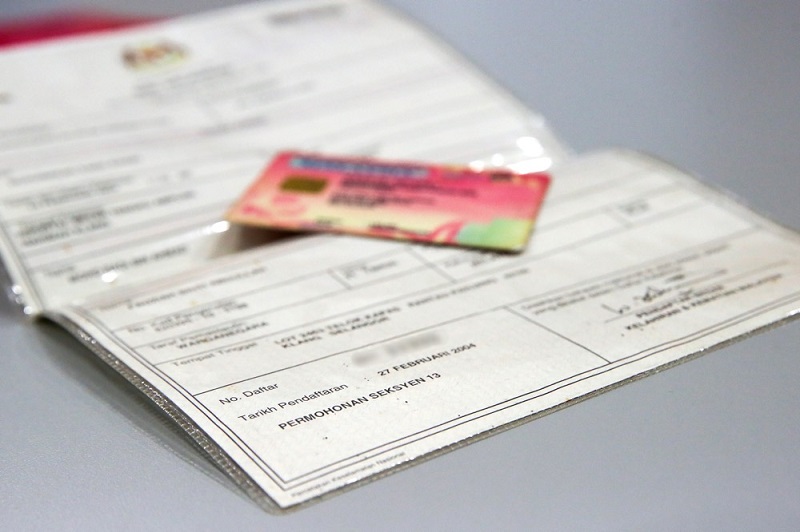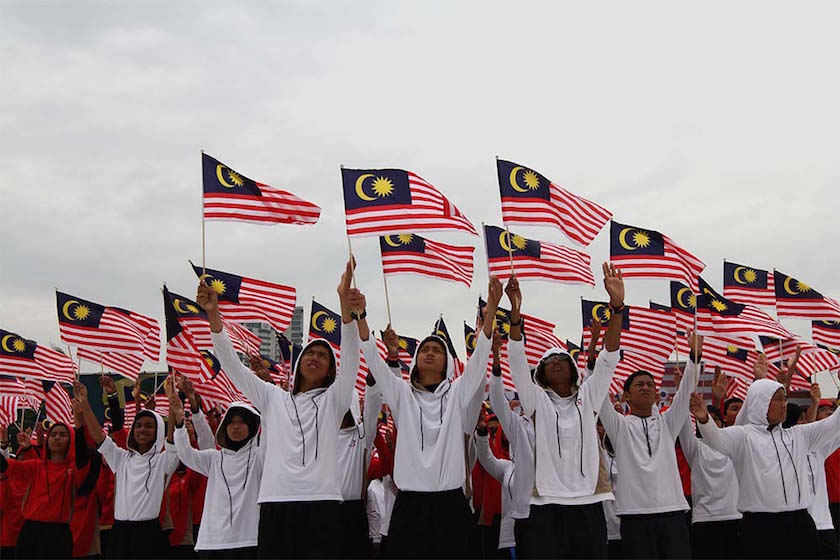KUALA LUMPUR, Feb 19 — The Federal Court’s majority ruling last Thursday said that the National Registration Department (NRD) was wrong to decide on its own to use “bin Abdullah” for a Johor-born illegitimate Muslim child’s name in his birth certificate, but also said that the NRD was right to disallow the father from using his name for the child.
However, three of the seven judges on the Federal Court panel in this case dissented, holding the opinion that the NRD should not have unilaterally used “bin Abdullah” for the child’s name — but for different reasons, and that the NRD was wrong to refuse the father’s application to have his name be part of the child’s name.
The three dissenting judges gave two separate judgments, with Chief Judge of Sabah and Sarawak Tan Sri David Wong Dak Wah reading his after the majority decision was delivered by Court of Appeal President Datuk Rohana Yusuf.
Federal Court judge Datuk Nallini Pathmanathan had on that day also read out her minority judgment that was agreed to by fellow Federal Court judge Datuk Abang Iskandar Abang Hashim.
In this case, the Johor-born child (whose name has been withheld) had sought to have his name in his birth certificate changed from A Child bin Abdullah to A Child bin MEMK to take after his father’s name MEMK, and for the words “Permohonan Seksyen 13” to be removed from the birth certificate.
(The “bin Abdullah” patronym and the “Permohonan Seksyen 13” entry were seen as obvious giveaways of his illegitimate status that could expose him to stigma).
Here’s a brief summary of what the minority judgments said:
What the case is not about
From the outset and throughout her minority judgment, Justice Nallini noted that it was not disputed that the Johor-born Muslim child was deemed illegitimate under Johor’s state Islamic law, stressing that this case was not about seeking to change this child’s illegitimate status to make him legitimate.
Instead, she said this case revolved around the Registrar-General of Births and Deaths’ scope of powers under a federal law — Births and Deaths Registration Act (BDRA) — when recording and registering the full name of Muslim illegitimate children or recording their “paternity” (who their father is) in the Register of Births and Deaths or the country’s official records.
In dissecting the case, Nallini listed four issues to be determined, including whether a legal provision under the BDRA allowing fathers to ask for their names to be registered as their illegitimate children’s surname were not applicable to Malays and/ or Muslims.
This legal provision refers to Section 13A of the Births and Deaths Registration Act covering the “surname” of children, which states that a legitimate child’s surname in official records is to be the surname if any of the father, while also saying that an illegitimate child’s surname if any is to be the mother’s surname if she provides such information or can be the surname of the person who acknowledges himself to be the father upon his request.
What does ‘surname’ mean?
In answering the first issue on whether Malays are excluded from the BDRA’s Section 13A, Nallini noted that a big part of the arguments presented by lawyers at the Federal Court was on the definition of “surname.”
While the word “surname” is not defined in the BDRA, Nallini said that the expert opinion provided by three academics — which said Malays have no surnames — were “entirely irrelevant” in answering what “surname” means in the BDRA.
This is because the term “surname” under the BDRA requires statutory interpretation or the court to interpret it, as it is a question of law, she said.
Nodding at the experts’ view that Malays have no “surname” based on the literal dictionary meaning and traditional English language and culture, Nallini said that it would be more “logical and reasonable” to interpret the word “surname” in line with the BDRA’s purpose to also include patronymic names. (The use of patronyms in Malaysia — including by Malays — typically sees the names of fathers being part of their children’s names.)
Nallini said that applying a literal meaning to “surname” would exclude Section 13A from applying to a majority of Malaysia’s population and that it would also exclude many other races locally such as Indians and Kadazans who similarly do not have family names or surnames as used in the traditional Western culture, pointing out that including “patronymic surname” would instead enable this provision to cover all Malaysians “regardless of race, culture and social convention.”
“In other words, to conclude that Section 13A is inapplicable to Malays and/or Muslims on the grounds that they do not possess surnames, would amount, in my view, to going against the express purpose set out in Section 13A, namely to afford a child born out of wedlock the right to have his father’s name specified on his birth certificate. This would run awry of the textual meaning to be accorded to ‘surname’ in that Section. Significantly, it would preclude such persons, albeit non-Muslims, from utilising Section 13A too,” she said.
The judge also highlighted that the legal interpretation of what “surname” means has to take into account the purpose of the BDRA, which she noted is a federal law enacted by the federal government to provide for a “full repository or register of births within the country” which would allow children to have an identity with the register recording the identities of their mother and father.
The judge said that BDRA was intended to apply to all Malaysians and did not have separate provisions for different races, noting: “It is applicable to all persons in the country, regardless of race and religion. No differentiation is made in the applicability of the provisions of the BDRA 1957 to the various races who comprise the citizens of this plural population comprising Malaysia. Neither does the Act relate to, provide for, or prescribe stipulations in relation to legitimacy, naming conventions, cultural practices or religious law. In other words it is an entirely secular Act.”
Nallini concluded that the NRD was legally obliged to record the Johor child’s name as ‘Child bin MEMK’ with MEMK’s personal name as a patronymic surname.
Justice Wong, the other judge who dissented, pointed out that the vast majority of Malaysians with the exception of the local ethnic Chinese do not have surnames in the traditional sense, and similarly said “surname” in Section 13A should be defined as including “patronymic surnames” as many Malaysians such as the natives of Sabah and Sarawak would otherwise be excluded.

How the Constitution views state laws and federal laws
Nallini also examined the issue of whether state laws enacted by state governments such as laws governing Muslims’ personal lives apply to federal laws enacted by the federal government such as the BDRA.
The Federal Constitution divides what Parliament can legislate and what state legislative assemblies can make laws on into two lists — Federal List and State List — under the Ninth Schedule.
(The two lists set out the exclusive matters that the federal government and state governments can make laws on, and with both not able to make laws under the other’s jurisdiction unless expressly authorised by conditions in the Constitution).
In explaining the constitutional arrangement, Nallini noted that it meant any laws made by the state government on Islamic personal laws only apply to that state, adding that matters falling strictly under the State List have no impact on matters that are exclusively under Parliament in the Federal List.
She noted that the strict federal nature of the BDRA is shown by the Constitution’s Federal List’s Item 3(e) which is national registration and Item 12(a) covering census and registration of births and deaths among other things.
While Article 3(1) provides for Islam as the religion of the federation with other religions to be practised in peace and harmony, Nallini noted that Article 3(4) — which provides that nothing in Article 3 would diminish other constitutional provisions — meant that the constitutional arrangement under Article 74 which divides the federal and state law-making powers continue to apply.
“Thus, Islamic law has no application insofar as the registration of deaths and births is concerned,” she said when citing the constitutional arrangement.
“The structure of the Federal Constitution in the present context is such that a clear divide is maintained between civil law, which is intrinsically secular in nature and applicable to all citizens on the one hand, and Muslim personal law on the other, which is confined to State legislation promulgated in accordance with the State List and applicable only to Muslims,” she said, describing this unique constitutional structure that embraces both secular and religious laws as “genius” and in keeping with the rule of law in Malaysia’s plural society.
The judge concluded that the contents of Johor’s Islamic Family Law (State of Johor) Enactment 2003 “cannot be imported and applied” in interpreting BDRA which is a federal law, as doing so would conflate or mix up federal law and state law, while also mixing up the two different concepts of “paternity and legitimacy” which are treated differently under state Islamic law and civil law.
The judge also said whether someone is legitimate or illegitimate when it comes to Shariah matters could easily be proven by calculating the difference from their date of birth and the date of their parents’ marriage.
‘Bin Abdullah’ vs with father’s name vs just child’s name
The two remaining issues that Nallini examined were whether the NRD was legally correct to impose “bin Abdullah” on the Johor-born child’s name, and whether — if the NRD acted beyond their powers — the court should order for the birth certificate to have the child’s name carry the father’s name MEMK or for the document to record only the child’s personal name.
Citing the above, Nallini said the NRD was not entitled to arbitrarily ascribe the name “bin Abdullah” to the Johor child’s name, further pointing out that the Registrar-General of Births and Deaths is merely carrying out an administrative function under the BDRA.
Since the BDRA did not provide for “bin Abdullah” to be used, the NRD or the Registrar-General were duty-bound under Section 27(3) of the same law to correct the mistake of using “bin Abdullah” for the Johor child’s name when asked to do so by the parents, as it would otherwise amount to the Registrar-General taking on a function that he has not been given under the BDRA, she said.
“Neither has he been conferred with powers as an adjudicator with the ability to adjudge on the best option to be adopted in relation to the naming convention of a child, be it in relation to religion, culture or otherwise,” she said, later adding that the Johor child should not have only his personal name registered in official records but should also carry his father’s name as Section 13A had been fulfilled.

What the other minority ruling said
Justice Wong, who had also noted that the Johor child’s illegitimate status was not in dispute and under the Shariah courts’ exclusive jurisdiction, pointed out that the Court of Appeal had noted that the Johor case revolved around the administration of civil law by civil authority and not the administration of Islamic law by a religious authority.
Wong also agreed with the Court of Appeal’s previous unanimous ruling that the NRD director-general or registrar-general is not bound by a fatwa issued by a religious body, as the latter’s jurisdiction and power under the BDRA is a civil one and limited to determining if the Johor child’s parent had fulfilled Section 13A(2) requirements for his name to be ascribed to the child’s name.
Wong also agreed with the Court of Appeal that a fatwa or religious opinion by a religious body has no legal effect unless adopted as federal law by Parliament, as such fatwa would otherwise become part of federal law without going through the legislative process. (The NRD had relied on two fatwas by a national-level committee of Islamic scholars when imposing “bin Abdullah” on the Johor child’s name.)
Wong also touched on the Johor child’s welfare and best interests when saying that the “Permohonan Seksyen 13” entry should be removed from the Johor child’s birth certificate, noting the Court of Appeal’s ruling had said the law did not require such an entry and that a child’s legitimacy could be easily determined by comparing the birth date and parents’ marriage date for matters such as inheritance disputes in Shariah courts.
Noting the United Nations Convention on the Rights of the Child’s Article 3 which places a child’s best interests as the primary consideration in all actions taken by those such as administrative bodies and courts (a clause which Malaysia has placed reservations on), Wong went on to highlight the birth certificate as a significant document that gives a person an identity in the eyes of the state and its use for matters such as school enrolment.
“Is it necessary for anyone to know whether someone was born illegitimate?...What useful purpose does this serve? Thus with respect, I think the Court of Appeal arrived at the right decision by ordering removal of the Section 13 endorsement,” he said of the entry which signals to the public the illegitimacy status of the child.
But with these two judgments being minority rulings, the majority decision is the one that applies in the Johor child’s case — namely both the removal of the “bin Abdullah” patronym and also the disallowing of the father’s name in the child’s name. The Federal Court also said the “Permohonan Seksyen 13” entry will remain on the child’s birth certificate.
Read here to see the reasons for the Federal Court’s majority decision.





















